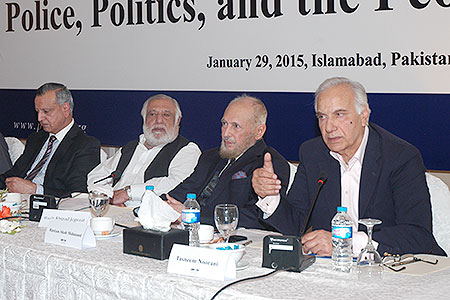|
|
| |
| EVENTS |
|
|
> Depoliticization of Police Critical for Good Governance: Experts
|
|
|
| |

Islamabad, January 29; Depoliticisation of police is critical for good governance in Pakistan, said experts and participants at a PILDAT Roundtable on Police, Politics, and the People of Pakistan. All parties should pledge to make Police free from political influence, they believed.
The experts stressed on the importance of upholding and implementing the Police Order 2002. It was proposed that the Ministry of Interior should establish the National Public Safety Commission by notifying six MNAs nominated by the National Assembly Speaker and also select six non-political members. The Federal Government should establish an independent Federal Police Complaints Authority as per Articles 97- 102 of the PO 2002. It was further suggested that the Police Act of 1861 should be repealed in Islamabad Capital Territory and replaced by the Police Order 2002. Similarly, for the Islamabad District, Public Safety Commission should be established under Chapter VII of PO 2002. There was an emphasis on the National Police Bureau to ensure that the National Police Management Board, comprising all the heads of the Federal and Provincial law enforcement agencies, meet at least twice a year for making recommendations on professional Police matters. Furthermore it was recommended that Islamabad Capital Territory Police should adopt a metropolitan policing model by raising the level of basic Police unit from a station to a division, headed by a Superintendent for public convenience and efficient management of professional Police functions under the same roof. |
|
| |
Dr. Shoaib Suddle, former IG Police, Mr. Tasneem Noorani, former Interior Secretary and Mr. Rustam Shah Mohmand, former Interior Secretary, and Mr. Ahmed Bilal Mehboob, President PILDAT, spoke at the Roundtable. Mr. Wazir Ahmed Khan Jogezai, former Deputy Speaker National Assembly of Pakistan, chaired the Roundtable.
As a key State institution responsible for maintaining law and order across the country, Police requires reform and strengthening, believes PILDAT. An in-depth review of Police and identification of required reforms has been carried out by PILDAT through papers focusing on Pakistan Police, authored by Mr. Tariq Khosa, former Federal Secretary, and Police Governance and Operational Autonomy in England and Wales authored by Mr. Ian Bracewell, Police Counter Terrorism Liaison Officer from the UK to Pakistan.
|
|
| |
Speaking on the occasion, Dr. Shoaib Suddle, former IG Police, believed the Police needed to reinvent itself in order to enhance its performance. He said the system of Police was to be changed right after independence as announced by Jinnah on August 17, 1947, However the efforts to reform police have been scuttled since. He said that the most important lessons to be leant from England and Wales is that Police there is operationally independent of political influence. He believed that there is a need to form a national agenda on de-politicization of police by all the political parties. Training and career progression of police has to linked with their performance. A ruthless and exemplary accountability system has to be in place to address the issue of corruption and abuse of authority in Police.
Mr. Tasneem Noorani, former Federal Secretary Interior, said that there is a lack of implementation of the Police Order 2002. The main issue is the selection and appointment of the IG of the Provinces which should be based on merit and ensure fixed tenure of office. He gave the example of Khyber Pakhtunkhwa where many police reforms have been put in practice as the IG has been appointed on merit and has a full authority to work according to the law. |
|
| |
Mr. Rustam Shah Mohmand, former Federal Secretary Interior, commended the PIDAT’s initiative of publishing the performance assessment of State Institutions. He recommended that this has to continue especially the performance of Police as it is critical to the well being of the citizens. He highlighted that the basic weakness in performance of Police is institutional control. Citizens face everyday excesses by the authorities. This requires a more local level institutional framework. Under Gen. Pervez Musharraf, the district magistracy was abolished which did not serve the purpose of required reforms. The law and order has further deteriorated due to this as there is no one to lead.
The Roundtable was attended by a large number of MPs and civil society representatives alongside the media. Prominent among MPs were Mr. Ali Muhammad Khan, MNA PTI, Mr. Sajid Nawaz, MNA PTI, Ms. Aisha Sayed, MNA JI, Malik Ihtebar Khan, MNA PML-N, Ms. Tahira Aurangzeb, MNA MNA, PML-N, Senator Saifullah Magsi, PPPP, Senator Surriya Amirrudin, PPPP, Senator Mohsin Leghari, IND, Senator Begum Najma Hameed, PML-N, Senator Hidayat Ullah, and Ms. Shahjehan Mangrio, MNA, NPP. |
|
| |
In his welcome remarks, Mr. Ahmed Bilal Mehboob, President, PILDAT, said the aim and objectives of the Roundtable is to understand the performance of Police in Pakistan, identify gaps in its performance and offer cogent recommendations for reforms. He highlighted that the model of Police in England and Wales has been illustrated in a paper commissioned by PILDAT from which Pakistan can draw lessons.
Police is often criticized because of corruption, inefficiency and politicization. Apparently there is a disconnect between the citizens and Police. Since independence no substantial reforms have been introduced. However the Police Order 2002 was an initiative that could have proved to introduce meaningful reforms but has not been implemented in letter and spirit. From 2007 to 2010 after transfer of power to civilian governments, appointments to the National Public Safety Commission were not made. |
|
| |
|
| |
|
|
| |
|
|
| |
|
|
| |
|
|
| |

|
|
|
|
|
|
|
|
|